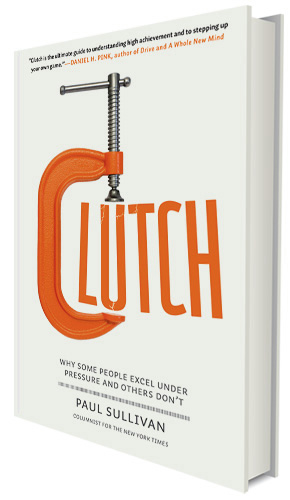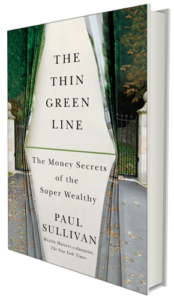Author Q&A
What does it mean to be clutch?
I define being clutch as the ability to do something that you can do under normal circumstances under extreme pressure. It may sound simple, but it isn’t. Think of how frustrating it is to hit great golf shots on the practice range and five minutes later roll the ball off the first tee. The good news is people who choke can learn to be clutch. The ease with which Phil Mickleson won The Masters this year stood in stark contrast to the many years when he choked in major tournaments.
Why did you write Clutch?
It started from a personal place. When I was a kid I invariably choked at every sport I played. I wanted to know why this happened, particularly since there were other areas of my life where I was good under pressure. That was the seed, but from there I started thinking about people who choked when it really mattered, when it was their job and it had serious consequences. We see the fallout from this every day in business, politics, military actions and, of course, sports. But my goal was to wrest the term “clutch” away from athletics where fans have such strong views of who is and is not clutch. For me, the question of why some people are great under pressure is an urgent one. Think of how poor the decision-making has been in the BP oil spill in the Gulf. In something like that, being great under pressure really matters. That same weight does not hang on the outcome of the NBA Finals.
What surprised you the most about clutch performers?
The similarities among people who were not clutch was the first big surprise: people are more apt to choke the same way than you would think. But the second one was how so few people who were truly great under pressure thought of themselves as clutch. That, of course, went a long way to explaining how they had been able to maintain their ability in intense situations. As David Price, the pitcher for the Tampa Bay Rays, told me: “Pressure is perceived. If I don’t put added pressure on myself, I’ll be fine.” That is what he thought before going out and pitching his team into its first World Series—by defeating the Boston Red Sox. Likewise, Bernie Marcus, who started The Home Depot, dubbed his management philosophy “running scared”. He was regularly making decisions under immense pressure that determined the success of his company and he admitted to me that at times a couple of wrong moves could have sunk the whole endeavor. It was constant pressure for him.
And the least?
That being better under pressure wasn’t about being mentally tough. I was skeptical of so much of what passes for sports psychology and also management psychology, if you will, because of this. And my research confirmed that there is an overemphasis on mental training. The people who were truly clutch were not necessarily smarter or savvier than those who were not. But they had learned the skills needed to be clutch.
What was the most valuable lesson you learned from these clutch performers?
That’s kind of like picking a favorite child. I learned a lot from all of them or I wouldn’t have included them in the book. But probably the chapter I keep coming back to is the one about special forces soldiers and secret service agents. The way they are trained to adapt under pressure blew my mind. And the line from this book that I think about most often in my day-to-day life is “fight the fight, don’t fight the plan.” It came from Colonel Thomas Kolditz, the head of the behavioral science department at West Point. We were sitting in his office in Thayer Hall, and he made the point that what soldiers do under pressure involves no margin for error. “It’s not an option for you to be bad,” he told me. “We can be bad at golf; we can be bad at our office jobs. If you’re going to put yourself in a position of putting people in dangerous contexts you have to be good at it.” That really resonated with me.
What about Tiger Woods?
Tiger was a constantly changing fixture in my book. I interviewed him in November 2008, a few months after he won the U.S. Open on a broken leg—and over a year before allegations of scores of affairs surfaced. He was the one person I had talked to that everyone wanted to ask me about. They were convinced he was the most clutch person I interviewed. Yet as soon as news about his affairs broke, most of those same people figured I would drop him entirely from the book, that his horrible judgment in his personal life somehow negated how he won many of his 82 tournaments under extreme pressure. Instead, to me, it proved that just because someone was clutch in a golf tournament did not mean he would be clutch in his personal life. As Tiger became a man of national interest, he became one of my most interesting case studies.
Are you clutch?
Yes and no. But what’s interesting is if you had asked me this at the beginning of the book I would have said I was a choker. As I write in the introduction, I’ve been clutch in my personal and professional life, and these have been the areas that have mattered most. But not in golf. What I learned, alas, was that since being clutch isn’t a mystical ability that can be bestowed on somebody, it takes work. But at least for me I know what to do now.


The Thin Green Line: The Money Secrets of the Super Wealthy
Sullivan is part of the “The One Percent” today, but he came from far humbler roots, starting life in the bottom twenty-five percent. This personal book shows how others can make better financial decisions—and come to terms with what money means to them. It lays out how they can avoid the pitfalls around saving, spending and giving their money away and think differently about wealth to lead more secure and less stressful lives. An essential complement to all of the financial advice available, this unique guide is a welcome antidote to the idea that wealth is a number on a bank statement.
Stay Tuned for Updates
I send thoughtful and caring emails
